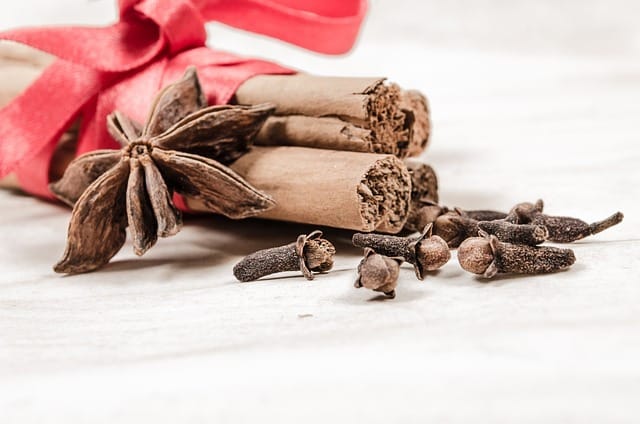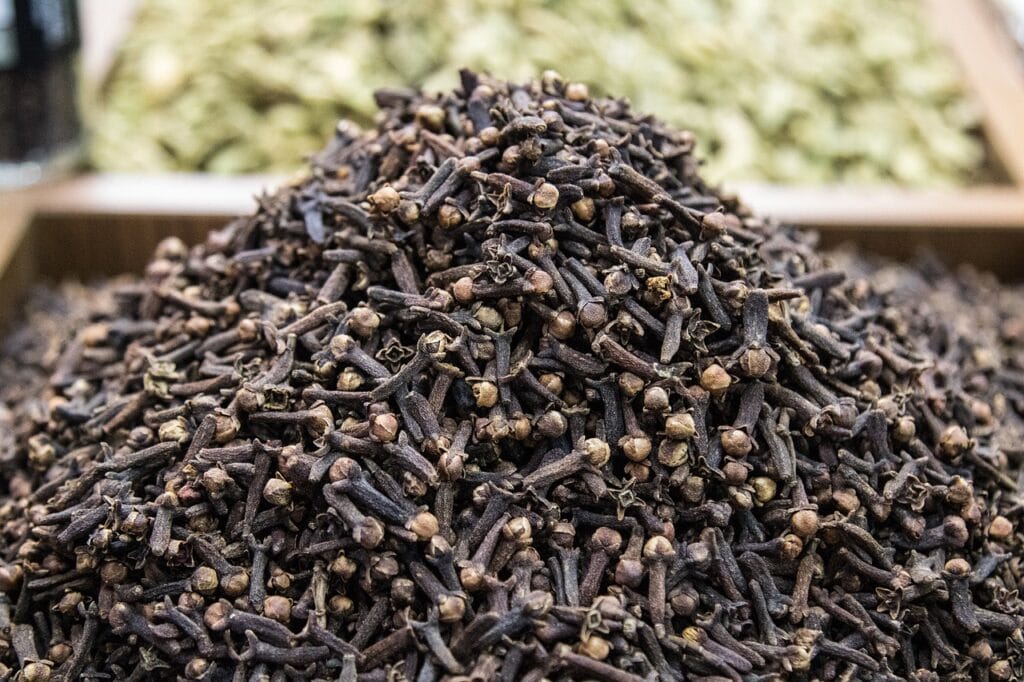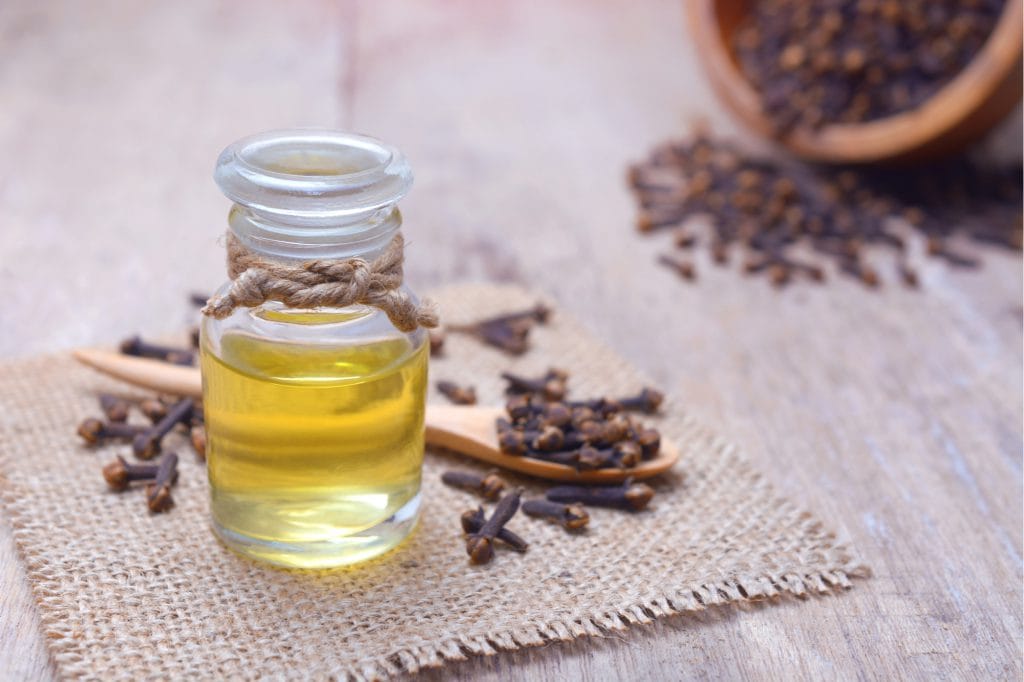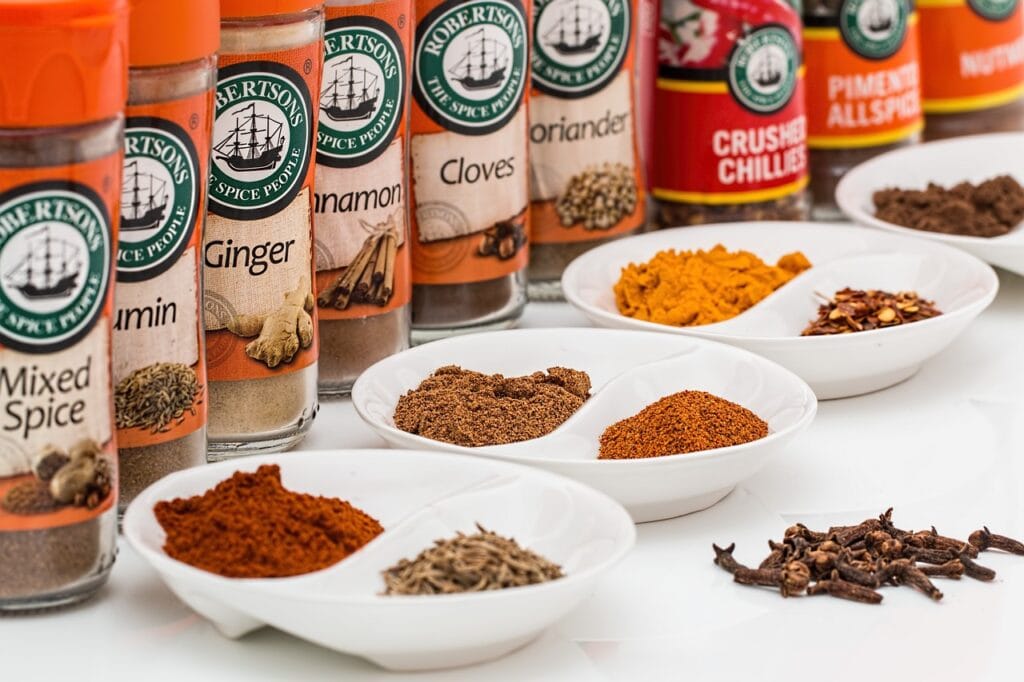Benefits of cloves? Everything you want to know about cloves

whole cloves: Everything you want to know about cloves: For thousands of years, cloves have been renowned for their aromatic qualities and numerous benefits. Widely used in cooking and traditional medicine, cloves have left a distinctive mark on the history of various civilizations.
Today, cloves continue to enjoy great popularity, not only as a distinctive flavor in dishes and desserts but also as a rich source of antioxidants and anti-inflammatory compounds.
In this article, we will explore the numerous benefits of cloves, their various uses, and potential side effects.
History of cloves
Cloves have a long and captivating history. Native to the Maluku Islands in Indonesia, these islands, also known as the Spice Islands, have been the cradle of the clove’s journey through time.
Historical Significance
In ancient times, cloves were an exceptionally valuable commodity. They were utilized both as a spice and in traditional medicine. The first introduction of cloves to Europe came through Arab traders in the 4th century AD. Cloves rapidly became a highly coveted item, known for their unique flavor and medicinal properties. By the 17th century, the Dutch had established dominance over the clove trade, maintaining a monopoly on this precious spice for several centuries.
Modern-Day Production and Uses
Today, Indonesia remains the largest producer of cloves globally, followed by Madagascar and Tanzania. Cloves are not only used as a spice in a wide range of dishes but also play a significant role in pharmaceuticals and perfumery. Their aromatic qualities and health benefits continue to make them an essential component in both culinary and medicinal applications.
Types of cloves
The Two Main Types of Cloves
Cloves are distinguished by their origin and flavor profiles. There are two primary types of cloves that stand out in culinary and medicinal use:
1. Zanzibar Cloves
Also known as Malaysian Cloves, these are renowned for their strong, pungent flavor. They are primarily cultivated in Zanzibar, Tanzania, and Madagascar. The Zanzibar clove is characterized by its robust and spicy taste, which makes it a popular choice for adding a distinctive kick to dishes and beverages.
2. Indonesian Cloves
Commonly referred to as Indian Cloves, this variety is known for its milder flavor compared to Zanzibar cloves. Indonesian cloves are grown in Indonesia, India, and Sri Lanka. They offer a subtler spice, making them versatile for various culinary applications where a less intense flavor is preferred.
Differences Between Clove Types
- Flavor: Zanzibar cloves are noted for their potent, spicy flavor, while Indonesian cloves have a more subdued taste.
- Color: Zanzibar cloves are typically dark brown, whereas Indonesian cloves are lighter in color, often ranging from medium to light brown.
- Size: Zanzibar cloves are generally larger in size compared to their Indonesian counterparts.
These distinctions not only influence the choice of cloves based on the desired intensity of flavor but also affect their use in different culinary and medicinal contexts.

Benefits of Cloves
Health Benefits of Cloves
Cloves offer a range of health benefits due to their rich composition of bioactive compounds. Here are some notable benefits:
1. Antioxidant Properties
Cloves are packed with antioxidants that help protect the body from cellular damage caused by free radicals. This protection can reduce the risk of chronic diseases such as heart disease and cancer by mitigating oxidative stress.
2. Anti-Inflammatory Effects
Cloves possess strong anti-inflammatory properties that can help alleviate pain and reduce swelling. This makes them beneficial for individuals suffering from inflammatory conditions like arthritis and asthma.
3. Antibacterial Characteristics
Cloves have natural antibacterial properties that can aid in combating bacterial infections. This is particularly helpful for those dealing with oral infections or dental issues.
4. Oral Health Improvement
The antibacterial and anti-inflammatory qualities of cloves contribute to better oral health. They can help reduce plaque, prevent tooth decay, and alleviate gum inflammation.
5. Digestive Health Enhancement
Cloves can improve digestion by stimulating the secretion of digestive enzymes. This can aid in relieving symptoms such as indigestion, bloating, and gas.
6. Immune System Support
Cloves help bolster the immune system by stimulating the production of white blood cells. This can enhance the body’s defense against infections and illnesses.
7. Mood Improvement
Cloves may have a positive effect on mood by boosting serotonin production. This can be beneficial for individuals experiencing depression or anxiety.
8. Potential Anti-Cancer Properties
Some studies suggest that cloves may possess anti-cancer properties, although further research is needed to fully confirm these benefits.
9. Liver Health Enhancement
Cloves can contribute to liver health by providing protective effects against liver damage. This helps maintain overall liver function and well-being.
10. Bone Health Benefits
Cloves may support bone health by increasing bone density. This can be valuable for maintaining strong and healthy bones over time.
Incorporating cloves into your diet or health regimen can offer these benefits, but it’s important to use them appropriately and consult with a healthcare professional, especially if you have specific health concerns or conditions.

whole cloves
Benefits of cloves sexually
Cloves are well-known for their wide range of health benefits, but they also offer several advantages related to sexual health and function. Here are some of the key benefits of cloves in the context of sexual health:
Benefits of Cloves for Sexual Health
1. Enhanced Libido
Cloves are believed to have aphrodisiac properties, which can help increase sexual desire and drive. The warming effect of cloves, combined with their stimulating properties, may help boost libido in both men and women.
2. Improved Blood Circulation
Cloves can enhance blood circulation due to their warming and stimulating effects. Improved circulation can lead to better blood flow to sexual organs, which is essential for sexual arousal and performance.
3. Increased Sensation
The stimulating properties of cloves might enhance sensitivity and sexual pleasure. By improving blood flow and nerve stimulation, cloves can contribute to more intense and enjoyable sexual experiences.
4. Stress Reduction
Cloves have been shown to have stress-relieving properties. Since stress and anxiety can negatively impact sexual health and performance, incorporating cloves into your diet or routine may help reduce stress levels and improve overall sexual well-being.
5. Hormonal Balance
Cloves contain compounds that may help regulate hormonal levels in the body. Proper hormonal balance is crucial for maintaining a healthy libido and sexual function.
6. Anti-Inflammatory Effects
Cloves’ anti-inflammatory properties can help alleviate conditions that might affect sexual health, such as inflammation-related pain or discomfort. Reducing inflammation in the body can lead to better overall sexual health.
7. Antioxidant Support
The antioxidants in cloves help protect cells from oxidative stress. This protection extends to reproductive organs and can support overall sexual health by reducing the risk of cellular damage and dysfunction.
How to Use Cloves for Sexual Health
- Incorporate into Diet: Add cloves to your meals, such as in teas, soups, or curries, to enjoy their health benefits.
- Clove Oil: Use clove essential oil in moderation, either in aromatherapy or diluted with a carrier oil for topical application. Always conduct a patch test to ensure there is no adverse reaction.
- Supplement Form: Clove supplements are available, but it’s important to consult with a healthcare provider before starting any new supplement regimen.
Considerations
While cloves offer several potential benefits for sexual health, they should be used as part of a balanced diet and healthy lifestyle. If you have specific health concerns or conditions affecting your sexual health, consult with a healthcare professional for personalized advice.
In summary, cloves can positively influence sexual health by enhancing libido, improving blood circulation, reducing stress, and supporting hormonal balance. Incorporating them into your diet or wellness routine may help boost your sexual well-being.
Benefits of cloves to a woman
Cloves offer a range of benefits that can be particularly advantageous for women. Here’s a closer look at how cloves can support women’s health:
Benefits of Cloves for Women
1. Hormonal Balance
Cloves may help in balancing hormones due to their nutrient-rich profile. This can be beneficial for managing menstrual cycles and alleviating symptoms associated with hormonal fluctuations, such as mood swings and cramps.
2. Menstrual Pain Relief
The anti-inflammatory and analgesic properties of cloves can help reduce menstrual pain and discomfort. Consuming cloves in tea or as part of a balanced diet may offer relief from menstrual cramps.
3. Digestive Health
Cloves support digestive health by stimulating the production of digestive enzymes and improving gastrointestinal function. For women experiencing bloating, gas, or indigestion, cloves can aid in digestion and alleviate discomfort.
4. Immune Support
Cloves boost the immune system by increasing the production of white blood cells. This helps protect against infections and illnesses, which is particularly valuable for women who need to maintain their health and vitality.
5. Skin Health
Cloves possess antimicrobial and antioxidant properties that benefit skin health. They can help combat acne, reduce inflammation, and promote clear, healthy skin. Clove oil can be used topically in diluted form to treat acne and other skin issues.
6. Bone Health
Cloves are a source of essential minerals like calcium and magnesium, which are important for maintaining strong bones. For women, especially those who are postmenopausal, maintaining bone health is crucial to prevent osteoporosis.
7. Mood Enhancement
Cloves may have mood-enhancing effects by stimulating the production of serotonin. This can help alleviate symptoms of depression and anxiety, contributing to better emotional well-being.
8. Antioxidant Protection
The antioxidants in cloves help combat oxidative stress and protect cells from damage. This can reduce the risk of chronic diseases and support overall health.
9. Weight Management
Cloves may support weight management by improving metabolism and reducing appetite. Their ability to enhance digestion and metabolic function can aid in maintaining a healthy weight.
10. Reproductive Health
Cloves have been traditionally used to support reproductive health. Their nutrient profile and anti-inflammatory properties can contribute to overall reproductive wellness.
How to Incorporate Cloves into Your Routine
- Culinary Use: Add cloves to your cooking, such as in soups, stews, and teas, to enjoy their health benefits.
- Clove Tea: Brew clove tea to help with digestive issues and menstrual pain.
- Clove Oil: Use clove essential oil in moderation, either in aromatherapy or diluted with a carrier oil for topical application. Ensure you do a patch test to avoid allergic reactions.
- Supplements: Clove supplements are available but should be used under the guidance of a healthcare provider.
Considerations
While cloves offer many health benefits, they should be used as part of a balanced diet and healthy lifestyle. If you have specific health conditions or concerns, especially related to reproductive health or chronic illnesses, consult with a healthcare professional for tailored advice.
In summary, cloves can support women’s health in various ways, including hormonal balance, menstrual pain relief, digestive health, immune support, and skin care. Incorporating cloves into your diet or wellness routine can help enhance overall well-being.

Cloves for hair growth
ealth benefits, and they can also be beneficial for hair health and growth. Here’s a detailed look at how cloves can contribute to hair growth:
Benefits of Cloves for Hair Growth
1. Stimulates Blood Circulation
Cloves contain compounds that can help stimulate blood circulation in the scalp. Improved blood flow ensures that hair follicles receive more nutrients and oxygen, which can promote healthy hair growth and reduce hair loss.
2. Antimicrobial Properties
The antimicrobial properties of cloves can help combat scalp infections, dandruff, and fungal issues. A healthy scalp is crucial for optimal hair growth, and cloves can assist in maintaining a clean and infection-free environment.
3. Rich in Nutrients
Cloves are rich in essential nutrients such as vitamins and minerals, including vitamin C, vitamin K, and calcium. These nutrients can strengthen hair, improve its overall health, and support growth.
4. Anti-Inflammatory Effects
The anti-inflammatory properties of cloves can help soothe an irritated scalp. Reducing inflammation can prevent conditions that lead to hair loss, such as scalp psoriasis or eczema.
5. Antioxidant Protection
Cloves are packed with antioxidants, which help protect hair follicles from oxidative stress and free radical damage. This protection can contribute to stronger, healthier hair and potentially reduce premature graying.
How to Use Cloves for Hair Growth
1. Clove Oil Treatment
- Ingredients: Clove essential oil and a carrier oil (such as coconut oil or jojoba oil).
- Method: Mix a few drops of clove essential oil with a carrier oil. Massage the mixture gently into your scalp and leave it on for 30-60 minutes before washing it out with a mild shampoo. Use this treatment once a week.
2. Clove Infused Hair Oil
- Ingredients: Whole cloves and carrier oil (such as olive oil or coconut oil).
- Method: Heat a small amount of carrier oil in a pan and add a handful of whole cloves. Allow the cloves to infuse in the oil over low heat for about 10-15 minutes. Let it cool, strain out the cloves, and apply the infused oil to your scalp. Leave it on for 30-60 minutes before rinsing.
3. Clove Tea Rinse
- Ingredients: Cloves and water.
- Method: Boil a handful of cloves in water for about 15 minutes. Let it cool, strain, and use the tea as a final rinse after shampooing your hair. This rinse can help to improve scalp health and add shine to your hair.
Considerations
- Patch Test: Always conduct a patch test before using clove oil or any new product to ensure you don’t have an allergic reaction or sensitivity.
- Moderation: Use cloves in moderation to avoid any potential irritation or adverse effects. Overuse of clove oil can lead to scalp dryness or irritation.
- Consultation: If you have any underlying scalp or hair conditions, consult a dermatologist or healthcare professional before incorporating cloves into your hair care routine.
In summary, cloves can be a beneficial addition to your hair care regimen, offering stimulating, antimicrobial, and nourishing properties that support healthy hair growth. Incorporating clove oil or clove-infused treatments into your routine can help enhance scalp health and improve hair strength and vitality.
Eating raw cloves daily
Eating raw cloves daily can offer various health benefits due to their rich nutritional profile and medicinal properties. However, there are also considerations to keep in mind. Here’s a comprehensive overview:
Benefits of Eating Raw Cloves Daily
1. Antioxidant Power
Cloves are packed with antioxidants such as eugenol, which help neutralize free radicals in the body. Regular consumption can aid in reducing oxidative stress and lowering the risk of chronic diseases.
2. Anti-Inflammatory Effects
Cloves contain compounds that have anti-inflammatory properties, which can help reduce inflammation and may benefit conditions like arthritis or general inflammation in the body.
3. Digestive Health
Eating raw cloves can stimulate digestive enzymes, which may aid in digestion. Cloves have carminative properties that help reduce bloating, gas, and indigestion.
4. Immune System Boost
Cloves support the immune system due to their high vitamin C content and antimicrobial properties. They can help in protecting the body from infections and enhancing overall immune function.
5. Oral Health
Chewing raw cloves can help maintain oral health. Cloves have antibacterial properties that can combat oral bacteria, reduce bad breath, and alleviate toothaches.
6. Blood Sugar Regulation
Some studies suggest that cloves may help regulate blood sugar levels by improving insulin sensitivity, which can be beneficial for individuals managing diabetes.
7. Mood and Mental Health
Cloves contain compounds that may have mood-enhancing effects. They can potentially help in reducing stress and anxiety, contributing to overall mental well-being.
Considerations and Risks
1. Strong Flavor
Raw cloves have a very strong, pungent flavor that may be overwhelming for some individuals. This strong flavor might cause discomfort or digestive upset if consumed in large quantities.
2. Potential Irritation
Eating raw cloves in excess may cause gastrointestinal irritation, including symptoms such as nausea, heartburn, or stomach pain. It’s important to consume them in moderation.
3. Interactions with Medications
Cloves, especially in large amounts, may interact with certain medications, including anticoagulants and blood-thinning medications. It’s important to consult with a healthcare provider if you’re on such medications.
4. Allergic Reactions
Some individuals may be allergic or sensitive to cloves. If you experience any allergic reactions or unusual symptoms, discontinue use and consult a healthcare professional.
How to Incorporate Raw Cloves
- Moderation: Start with a small amount to see how your body reacts. A common recommendation is to consume 1-2 cloves per day.
- Chewing: Chew raw cloves slowly to release their beneficial compounds and to enjoy their flavor.
- Blending: You can blend cloves into smoothies or mix them into dishes to incorporate their benefits in a more palatable way.
Conclusion
Incorporating raw cloves into your diet can offer several health benefits, including improved digestion, immune support, and antioxidant protection. However, due to their strong flavor and potential for gastrointestinal irritation, they should be consumed in moderation. If you have any health conditions or are on medication, consult with a healthcare provider before making significant changes to your diet.

How to prepare cloves
How to Prepare and Use Cloves
1. As a Spice:
- Adding Cloves to Dishes:
- Whole Cloves: You can add whole cloves to your dishes to infuse them with a warm, sweet, and spicy flavor. They are commonly used in curries, rice dishes, meats, and desserts.
- Ground Cloves: Ground cloves are often used in baking and cooking to provide a more uniform flavor. They can be added to spice blends, marinades, and sweet treats.
- Preparing Clove Tea:
- Ingredients: Whole cloves and water.
- Method: Boil a handful of whole cloves in water for about 10-15 minutes. Strain and let it cool slightly before drinking. You can enhance the flavor by adding honey or lemon.
- Making Clove Infused Beverage:
- Ingredients: Whole cloves, water, optional honey or lemon.
- Method: Boil cloves in water, then strain. Add honey or lemon to taste. This infusion can be enjoyed as a soothing beverage.
2. For Medicinal Purposes:
- Relieving Toothache:
- Clove Oil Application: Apply a drop of clove oil directly to the affected area using a cotton swab. The eugenol in clove oil provides pain relief and has antiseptic properties.
- Sore Throat Relief:
- Clove Tea: Drink clove tea to soothe a sore throat. The anti-inflammatory properties of cloves help reduce inflammation and discomfort.
- Treating Nausea and Vomiting:
- Cloves: Chew a few whole cloves or consume ground cloves to help alleviate nausea. Alternatively, you can use clove oil in small amounts.
3. In Pharmaceuticals:
- As an Ingredient in Medications:
- Pain Relievers and Antibiotics: Cloves are used as a component in various medications due to their analgesic and antimicrobial properties. They are included in pain relief products and some antibiotics.
4. In Perfumes:
- Adding Fragrance to Perfumes:
- Clove Oil: Clove oil is used in the perfume industry to add a warm, sweet, and spicy aroma. It can be blended with other essential oils to create complex and inviting fragrances.
Tips for Using Cloves:
- Moderation: Cloves have a strong flavor and medicinal properties, so use them in moderation to avoid overpowering your dishes or causing irritation.
- Storage: Store whole cloves in an airtight container in a cool, dark place. Ground cloves should also be kept in an airtight container to preserve their potency.
- Quality: Use high-quality cloves to ensure you’re getting the best flavor and benefits. Fresh cloves are more potent and aromatic.
Conclusion:
Cloves are a versatile spice with a wide range of uses, from enhancing the flavor of your dishes to providing medicinal benefits and adding a distinctive aroma to perfumes. Whether you’re using them in cooking, for health purposes, or in the fragrance industry, cloves offer numerous benefits when used appropriately.
raed moor:
